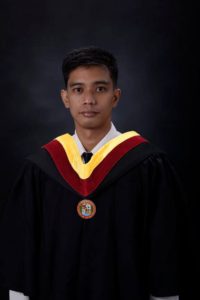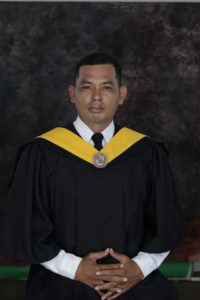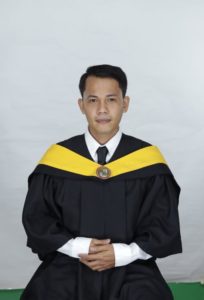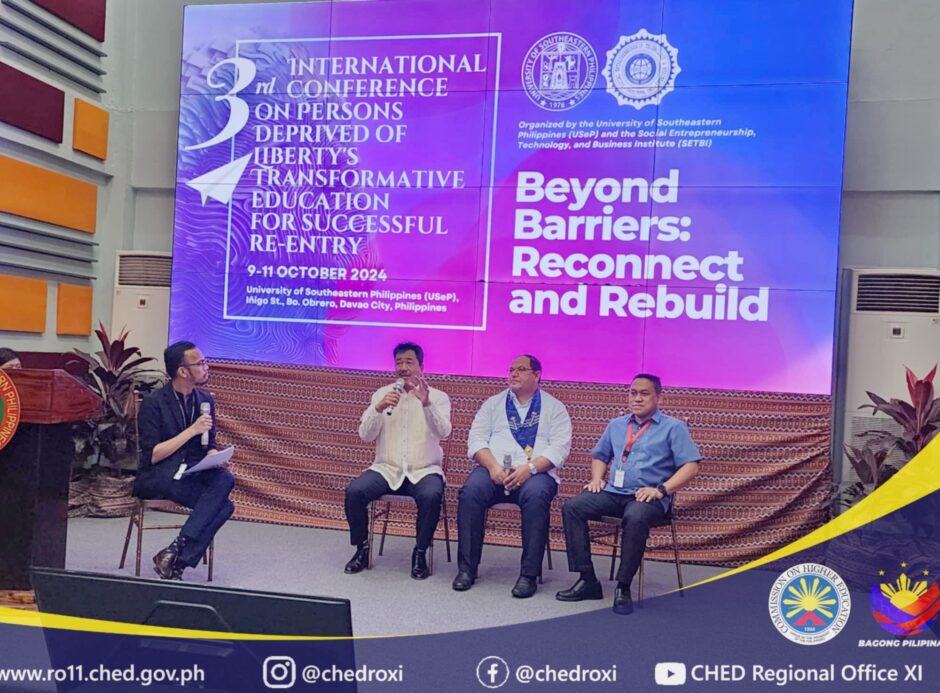


 Marking a first for College Education Behind Bars at the Davao City Jail, thirty-two Persons Deprived of Liberty (DPL) graduated with a four-year bachelor’s degree or a senior high school diploma. The students in the higher education program denote the first to earn a four-year college degree, and thus a diploma, from the University of the Southeastern Philippines while incarcerated. This diploma allows the graduates to take a step toward freedom. Although the jail had an Alternative Learning System previously, the Thompson Christian School awarded the senior high school students their official diploma. These 32 men and women are a testament to the power of education and the positive influence of College Education Behind Bars at the Davao City Jail. Their success refutes the notion that offenders do not merit tertiary education and do not have the capacity to change, a view often perpetuated by media as it sensationalizes the darker side of humanity in confinement. Today we celebrate the bright side as a contrast to current crises. To both the public and to elected officials, this significant graduation conveys an important message that says the more opportunities DPL have to learn, value education, and seize possibilities, then the greater the chance they will break the cycle of imprisonment not just for themselves but for future generations to come. These individuals have shown great resilience and discipline by completing their college degree plan. Further, their commitment and adherence to rules and regulations define the best way to implement the Good Conduct Time Allowance (GCTA) law for a reduction of sentences.
Marking a first for College Education Behind Bars at the Davao City Jail, thirty-two Persons Deprived of Liberty (DPL) graduated with a four-year bachelor’s degree or a senior high school diploma. The students in the higher education program denote the first to earn a four-year college degree, and thus a diploma, from the University of the Southeastern Philippines while incarcerated. This diploma allows the graduates to take a step toward freedom. Although the jail had an Alternative Learning System previously, the Thompson Christian School awarded the senior high school students their official diploma. These 32 men and women are a testament to the power of education and the positive influence of College Education Behind Bars at the Davao City Jail. Their success refutes the notion that offenders do not merit tertiary education and do not have the capacity to change, a view often perpetuated by media as it sensationalizes the darker side of humanity in confinement. Today we celebrate the bright side as a contrast to current crises. To both the public and to elected officials, this significant graduation conveys an important message that says the more opportunities DPL have to learn, value education, and seize possibilities, then the greater the chance they will break the cycle of imprisonment not just for themselves but for future generations to come. These individuals have shown great resilience and discipline by completing their college degree plan. Further, their commitment and adherence to rules and regulations define the best way to implement the Good Conduct Time Allowance (GCTA) law for a reduction of sentences.
More than just furthering their education, College Education Behind Bars offers a place where PDL can change their life. They have embraced the challenge to overcome years of rehabilitating excuses and crippling experiences. More importantly, CEBB helps break stereotypes about inmates since in many cases they have become the first person in their family to earn a college degree.
Usually prison culture forces men to divide themselves along racial lines or religion beliefs and to avoid socialization with other races or groups ; failure to abide by these culture norms often results in violence. The power of education has actually changed the culture within prison because the freedom that came with the change allowed inmates to reconnect through the idea that despite their circumstances, they can accomplish something meaningful in their lives. These men and women set goals, work hard to achieve them, as well as model good behavior, a work ethic, and study habits necessary to guide them towards their dreams, tools that will serve them through life.
College Education Behind Bars creates new choices as well as new and alternative ways of being and thinking that lie between the extreme of compliance and disobedience, between resistance and surrender, between personal accountability and forgiveness and success. Today’s prisons are not conducive for rehabilitation; they are human warehouses. Although it is critical that we protect citizens, the focus on protecting the public by locking offenders away and keeping them inside as long as possible does not allow fo rehabilitation, so that when PDL return to society, and most of them do, they are no longer a threat but become an asset.
The greatest error for the DPL and for us would be to do nothing. These individuals who graduated did not want to waste their life inside so they welcomed a program that improved their lives and productivity. They woke up early each morning, ate their breakfast, did their job at the Davao City Jail, and then went to school every day from Monday through Friday, even attending the recovery program on Saturday. Like college students elsewhere, they worked at class assignments and research papers, read textbooks, and gradually completed courses—all giving them a purpose in life. Their prison became a university, an engaging career training center, and a rehab facility. Their depressed spirits were uplifted and their glazed eyes enlightened.
The key to successful rehabilitation is that the prison system in its partnership with the academic world, business and industry, and political leadership ally to assist PDL in leaving different from they entered. Inside the Davao City Jail, the sapling of College Education Behind Bars incorporated with the recovery program has grown into a reproducing tree, so that its graduates transform their outlook, their habits, and their personal and career paths and subsequently their families and communities.
Our destiny is not defined by our past. Rejecting definitions of them, obstacles blocking them, and their past bad choices, they have redefined, defied, and negated a tainted record by graduating from college. Sometimes prison is necessary but usually PDL like Madalya, Aguilar, Dave, Justin, Omar, Peter, and others go back into society. Once incarcerated but now free, educated, and working, they have the knowledge and credentials to survive, secure a job, afford housing, and support their families, all the while holding their head high when they enter into society and knowing how to handle the freedom. Despite the statistics stacked against them in terms of recidivism, primarily because of unemployment, Madalya, Aguilar, Pacana and others have a diploma in hand and the skills from the recovery program to guide them and to help them find the new friends and fellowship transforming their lives and even overcoming their prison record.
College Education Behind Bars partnered with University of Southeastern Philippines (USEP) to educate those who qualify in the Davao City Jail, Now CEBB partners with Davao Del Norte State College ( DNSC) to replicate its College Education Behind Bars on a second campus at the Davao Prison and Penal Farm (DaPeCol) and offers the following programs at both campuses (1) a four-year degree college education through USEP/DNSC, (2) a recovery program, inside and outside of the jail, (3) a senior high program, (4) vocational and technical programs, and (5) a transition, reentry, and ready for work program.
The four-year degree programs through USEP and DNSC offer (a) a Bachelor of Technology in Computer Science, (b) a Bachelor of Science in Agricultural Business, (c) a Bachelor of Science in Food Technology, and (d) a Bachelor’s in Social Entrepreneurship.
Established in 2015, the Social Entrepreneurship Institute is the initiative of Minority Care International (MCI), a non-profit educational and economic development organization serving Davao City for more than a decade. SETBI seeks to recognize social problems and to achieve social change by using the entrepreneurial principles, process, and operations to solve these problems. It seeks to study and discover the social problems and what solution is not working, and then to create and organize alternatives what will work , initiating collaboration with stakeholders, and managing a social venture to attain the desired change. In 2016 , Dr. Aland Mizell conceived of and founded the first College Education Behind Bars in the Philippines with the support of Attorney Susan Cariaga. The SETBI partnered with the Bureau of Jail Management and Penology (BJMP), the Commission on Higher Education of the Philippines (CHED), the Dangerous Drug Board (DDB), the Bureau of Corrections (BuCor), the University of Southeastern Philippines (USEP), and the Davao Del Norte State College (DNSC) to establish College Education Behind Bars, the first such initiative in the Philippines and in Asia to provide college education and to construct a physical college building inside the jail and in the prison. This program allows the PDL to earn a degree from USEP/DNSC while serving their sentence.
Congratulations to the class of 2021! I wish them the very best as they start a new chapter in their life. We are proud of their accomplishment. My hope is that each of them learned from their past mistakes and have turned them into successes through College Education Behind Bars. I pray they will grow spiritually and professionally. The greatest lesson they have learned in the program is that the efforts of the entire community made their education work so that the benefits they reap are not only for them as individuals but also for the entire community at large. Thus, education is a community effort with community benefits. Now, You earn your college degree , you can write your owns story
Now they can show the world how they can make it a better place for in our community and country, keeping in mind that our greatest success in life are often found in helping others succeed. I would like to thank the people who inspired you all with their determination leadership, and vision and made the program what it is. The institutions of MCI, SETBI, USEP, DNSC, BJMP, and the Don Antonio O. Floirendo, Sr., Foundation, as well as Attorney Susan Cariaga, Vice President of SETBI; Amy Cabusao, the Editor in Chief of The Mindanao Times; Dr. Lourdes C. General, President of the University of Southeastern Philippines; and the students’ families and friends that helped them reach this goal in their life. I hope the graduates stay connected with the SETBI because there are many teachers andprofessors who respect them for their hard work. I congratulate them on all their accomplishment and encourage them to continue to step boldly to their hard-earned greatness.
Aland Mizell, President and Founder of College Education Behind Bars (CEBB)
CEBB is a criminal justice reform effort by The Social Entrepreneurship, Technology, and Business Institute (SETBI), an educational initiative of Minority Care International

